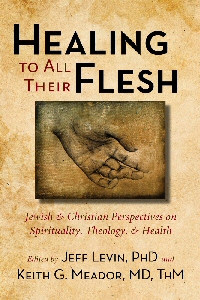Healing to All Their Flesh

Healing to All Their Flesh
Recent years have seen a burgeoning of research on the relationship between religious involvement and indicators of personal and population health. Yet, increasingly, even the best of this work reads as if written in a theological vacuum, existing outside of any recognizable context in which religious scholars understand the role and impact of religion. Religious identity and practice, as conceived of in these studies, is often at odds with normative understandings of what it means to be a religious person within the major faith traditions. Thus, the sorts of research questions posed in this body of research and the explanations advanced for significant findings are similarly disconnected from these normative understandings. This phenomenon has served to advance some very unrealistic and even dangerous expectations about the influence of faith on health and well-being. Religion is now promoted as a commodity or good to be used to improve one’s health independent of other considerations. Poor outcomes, seen through this lens, are thus failures of faith—a terrible burden to place on people already suffering from health challenges.
Healing to All Their Flesh asks us to step back and carefully rethink the relationship between religion and health. It does so by examining overlooked issues of theology and meaning that lie at the foundation of religion’s supposed beneficial function. Is a religion-health relationship consistent with understandings of faith within respective traditions? What does this actually imply? What does it not imply? How have these ideas been distorted? Why does this matter—for medicine and healthcare and also for the practice of faith? Is the ultimate relation between spirit and flesh, as mediated by the context of human belief and experience, a topic that can even be approached through empirical observation, scientific reasoning, and the logic of intellectual discourse?
The editors of this collection, Drs. Jeff Levin and Keith G. Meador, have gathered together the writings of leading Jewish and Christian theological, pastoral, ethical, and religious scholars to answer these important questions. Contributors include Richard Address, William Cutter, Elliot N. Dorff, Dayle A. Friedman, Stanley Hauerwas, Warren Kinghorn, M. Therese Lysaught, Stephen G. Post, John Swinton, and Simkha Y. Weintraub, with a foreword by Samuel E. Karff.
Table of Contents
Foreword / ix
Rabbi Samuel E. Karff, DHL
Acknowledgments / xiii
Prologue. The Intersection of Spirituality, Theology, and Health / 3
Jeff Levin
Part 1: Jewish Perspectives
1. Cure and Healing, Where God Met Science: Four Decades of Spiritual Progress / 17
William Cutter
2. Contemplating a Theology of Healthy Aging
Richard Address / 26
3. Dwindling or Grateful: Toward a Resilient Old Age / 52
Dayle A. Friedman
4. Using Jewish Law to Respond to Contemporary Issues in Bioethics / 65
Elliott N. Dorff
5. Give Me Your Hand: Exploring Judaism’s Approach to the Relationship of Spirit and Health / 97
Simkha Y. Weintraub
Part 2: Christian Perspectives
6. St. Thomas Aquinas and the End(s) of Religion, Spirituality, and Health / 123
Warren Kinghorn
7. Beguiling Religion: The Bifurcations and Biopolitics of Spirituality and Medicine / 150
M. Therese Lysaught
8. The Ontological Generality in Spirituality and Health / 186
Stephen G. Post
9. From Health to Shalom: Why the Religion and Health Debate Needs Jesus John / 219
Swinton
10. Suffering Presence: Twenty-Five Years Later / 242
Stanley Hauerwas
Epilogue. Theology and Health: Challenges and Possibilities / 259
Keith G. Meador
About the Contributors / 271
Index / 272